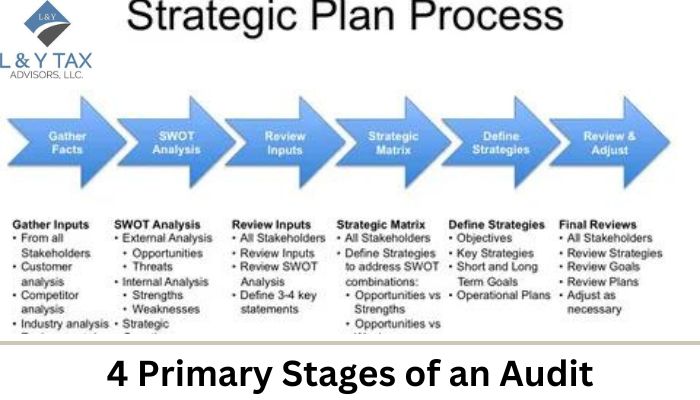
What are the 4 Primary Stages of an Audit?
Auditing is an essential procedure for ensuring that financial statements are reliable and accurate. Learning what are the 4 primary stages of an audit maintains openness and confidence with stakeholders. Firms of all sizes must have their financial records audited.
Fieldwork, Reporting, Follow-up, and Planning are the four main phases of an audit.
Each step of the audit process is highly important to guarantee that the financial statements are carefully reviewed and validated.
Read about the IRS & state audit representation.
Audit Stage 1: Organizing
The audit’s basis is laid at the planning phase. Auditors learn about the financial reporting architecture, internal controls, and business environment in this stage. They evaluate the possibility of a material misrepresentation and create an audit strategy to mitigate that risk. Important tasks at this point consist of:
Comprehending the Client
Auditors examine the sector, legal framework, and distinctive features of the business.
Risk Assessment
It involves locating potential high-risk locations for false assertions.
Establishing Materiality
Determining the bar for substantial misstatements.
Developing an Audit Strategy
Creating a thorough plan that specifies the kind, timing, and scope of audit processes.
Adequate preparation guarantees that the audit is carried out quickly and painstakingly, concentrating on where mistakes are most likely.
Audit Stage 2: Fieldwork
The practical portion of the audit, known as fieldwork, is when auditors examine internal controls and carry out substantive processes. Obtaining proof to back up the claims made in the financial statements is the task of this step. Essential functions at this point consist of:
Testing Internal Controls
Assessing how well the business’s internal financial reporting controls work.
Substantive Testing
Checking the correctness of transactions and account balances by running thorough tests.
Obtaining Evidence
Through inspection, observation, questions, and confirmations, obtaining adequate and pertinent evidence bolsters audit conclusions.
The fieldwork phase is essential since it serves as the foundation for the auditors’ view of the financial accounts.
Audit Stage 3: Reporting
Auditors gather their information and formulate a conclusion on the financial statements at the reporting stage. The audit report contains the auditor’s opinion and is released at the end of this phase. Important tasks at this point consist of:
Drafting the Audit Report
Writing a report outlining the methods followed, the results, and the scope of the audit.
Examining the Results
Ensuring that every vital problem found during the audit has been adequately resolved.
Speaking with Management
Bringing up conclusions and suggestions with management and governance-related personnel of the organization.
The audit report, an important document, provides stakeholders with an impartial evaluation of the financial accounts.
Audit Stage 4: Follow-Up
The follow-up phase ensures that management has addressed the problems found during the audit. This phase entails:
Monitoring Corrective Actions
Making sure the business follows the audit’s recommendations.
Analyzing Improvements
Determining how well the company’s modifications worked.
Preparing for Future Audits
Applying learned lessons to enhance the preparation of the next audits.
The purpose of the follow-up stage is to further enhance the value of the audit by encouraging ongoing enhancements to the company’s financial reporting procedures.
The Importance of Each Stage in the Audit Process
Planning, performing fieldwork, reporting and follow-up are some of the core stages that combine to ensure an organizations’ financial records receive a comprehensive review and verification process. Each stage is important to identify any misstatements and ensure that everything is reconciled before your financial statements are complete.
- During the planning stage, auditors prepare for a successful audit by obtaining certain key information about how the business manages its finances in order to evaluate potential risk areas. This advance preparation lets auditors zoom in on high-risk aspects that might need closer examination.
- In the fieldwork phase, auditors also test internal controls and conduct substantive testing to obtain evidence. This step is crucial, as it serves to gather the relevant documents and verifiable information that back up whatever conclusions the auditor makes. Good fieldwork makes sure the financial statements indeed portray a true and fair view of the business.
- It is the reporting stage when an auditor tells what he has found. In addition to summarising the method of audit and outcome, it documents whether or not the auditor’s opinion on the financial statements is ‘unqualified’. This openness is critical to gain the confidence of those who rely on the financial information being reported.
- Finally, an accession phase is defined to make adjustments. It concentrates on whether management has taken action on the recommendations of the audit report and if improvements were actually made. This phase follows a circle, and underlines the significance of continuous financial integrity.
Knowing these phases brings out the diligence involved in audit and why it is significant to implement in order to uphold financial credibility and responsibility, regardless of the size of the company.
Get the best Tax Consulting Services here!
The Bottom Line
A thorough understanding of the audit process is possible by comprehending what are the 4 primary stages of an audit. Ensuring the accuracy and dependability of financial statements is crucial at every step since it boosts stakeholder confidence and advances financial transparency.
Contact L&Y Tax Advisors, LLC. for further assistance in your taxation and financial matters.


